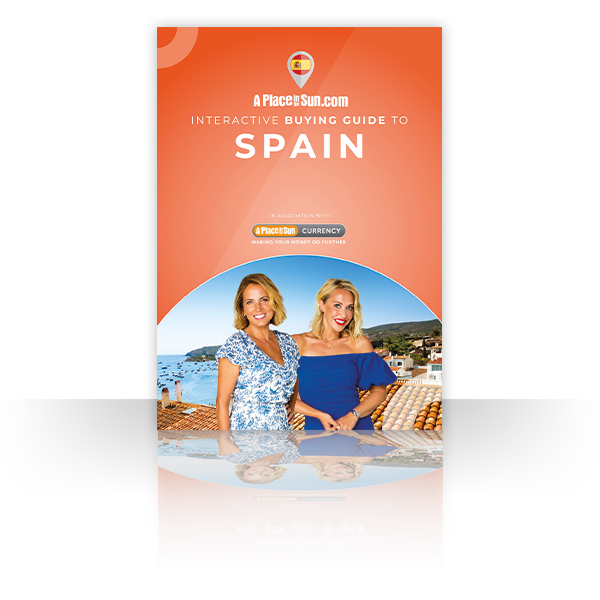-
Find your place in the sun
- Home
-
Property Search
- Property Search
-
Property in Spain
- Property in Spain
- Almeria
- Costa Blanca
- Costa del Sol
- Costa Brava
- Costa de la Luz
- Costa Tropical
- Murcia
- Valencia
- Inland Andalucia
-
Canary Islands
- Canary Islands
- Tenerife
- Fuerteventura
- Lanzarote
- Gran Canaria
- Balearic Islands
- All Areas
- Property in France
-
Property in Portugal
- Property in Portugal
- Algarve
- Albufeira
- Lagos
- Lisbon Coast
- Silver Coast
- All Areas
- Property in Italy
-
Property in Greece
- Property in Greece
- Aegean Islands
- Corfu
- Crete
- Halkidiki
- Ionian Islands
- All Areas
- Property in Florida
- Property in Cyprus
- Property in Turkey
- Search all countries
- New Developments
- Find an agent in...
- Most Popular Properties
-
-
Help & Guides
- Help & Guides
- How to Buy
- Area Guides
- Free Guide Download
- Professional Services
- Currency
- Mortgages
- Insurance
-
Relocation
- Relocation
-
Moving to Spain
- Moving to Spain
- Buying property in Spain
- Living in Spain
- Retiring to Spain
- How to move to Spain
-
Moving to France
- Moving to France
- Buying property in France
- Living in France
- Retiring to France
-
Moving to Portugal
- Moving to Portugal
- Buying property in Portugal
- Living in Portugal
- Retiring to Portugal
-
Moving to Italy
- Moving to Italy
- Buying property in Italy
- Living in Italy
- Retiring to Italy
-
Moving to Cyprus
- Moving to Cyprus
- Buying property in Cyprus
- Living in Cyprus
- Retiring to Cyprus
- Moving to Malta
- Find a Lawyer
- Viewing Trips Guide
- Articles
- Webinars
- New Developments
- Live Events
-
TV Show
- TV Show
- Episodes
- Presenters
- Apply
- Advertise with us
-
- Sign up / sign in
- Currency
- Find an agent
- Advertise with us
Digital Nomad Visa in Spain
 Sun, Sangria, and Spreadsheets: Work from Spain with the Digital Nomad Visa!
Sun, Sangria, and Spreadsheets: Work from Spain with the Digital Nomad Visa!
Working from anywhere is a trend that is here to stay. Why sit in the same old office (or, far worse-commute!) when you could be on a sunny Spanish balcony, a Greek café or soaking in the atmosphere on an Italian piazza?
The attraction of moving around, mixing things up, escaping the winter months – there’s much to love. Add in some tax benefits – that some countries offer – and the offer becomes even more tempting.
Since the pandemic a number of countries have been introducing their own versions of the digital nomad visa (DNV) – and now there’s a sense that you are missing a trick if you are a government that don’t offer one (and France, that means you!)
Amongst those DNVs that have been of the most interest to British nomads, are Spain, Portugal and Greece. These locations are popular for a variety of reasons, usually topped by climate, but then local housing prices, accessibility, health and safety, infrastructure and remote working capabilities.
Digital Nomad Visa in Spain
Spain is still the top choice for the British and the Spanish DNV has attracted nearly 10,000 people from third-country nationals by Spring 2025.
Minimum monthly income of €2,763. Note that it’s easier to apply for from in Spain – most people will move out there and apply within their 90-day limit.
Part of the ‘Start-up Law’ this visa is designed for those work for a company based outside the EU/EEA and it has proved very popular. Only 20 per cent of your professional activity must be carried out in Spain so the other 80 per cent must be for a company located outside the EU/EEA.
Further, the visa applicant must have been employed by the company, or group of companies, for at least one year already, and must provide documentation from their employer that their job can be carried out remotely. There must be a minimum education or experience level, and the absence of a criminal record for the past five years, plus private healthcare. Applications can be made through the Spanish Consulate in the UK or in Spain (the latter is easier and you get a longer visa: three years).
This visa currently requires a minimum net income of €33,156 per year for a single person (plus another 20% for spouse, and/or another 15% per dependent child). Bear in mind these figures also increase slightly every year. The application process can be very fast in Spain – even just three to five weeks.
Tax Benefits of the Digital Nomad Visa
The visa can bring tax benefits. Holders can apply - within six months – for the Special Expats’ Tax Regime (SETR), or Beckham Law – which means a flat 24 per cent rate tax of income tax up to €600,000.
This is making it very popular with wealthy company owners and entrepreneurs right now. Since are you considered non-resident for tax purposes, you will not be liable for wealth or solidarity tax on worldwide assets. Some Spanish regions (such as Madrid and Andalusia) have changed their wealth tax thresholds to make themselves more attractive to high-net-worths, but the solidarity tax should be considered if you have considerable assets. Bear in mind that it if you apply for it from Spain you can get one for three years; if you apply from the UK it’s just one year. It can take as little as 7-10 days, depending on region.
